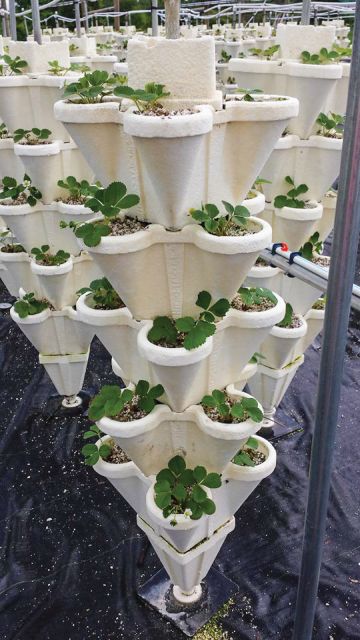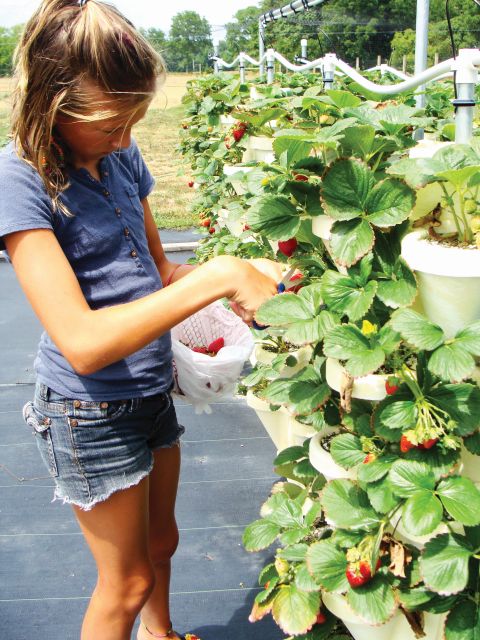Pick-Your-Own Berries With A Twist

Visitors can pick berries from 16,000 plants grown in a hydroponic system from July to August each year. (Photo courtesy of Summer Breeze Strawberries)
Although Lisa and Daniel Conklin have only been managing their pick-your-own operation Summer Breeze Strawberries for two years, they have hit the ground running during that time, establishing themselves as the go-to berry picking operation in their area.
Located in Castille, NY, the hydroponic strawberry farm currently produces 16,000 strawberry plants for visitors to come pick from July to August each year. In addition to berries, the Conklins produce beans for pick-your-own, and also grow salad mix, cilantro, basil, parsley, and beets.
The Conklins purchased the hydroponic system from its original owner who retired from production in 2014, and moved it three hours to its current location. Without any prior knowledge of hydroponic production or any hands-on agricultural experience, the couple dealt with a steep learning curve, and say they are still learning.
“We spoke to the previous owner Paul all the time to help us in the beginning,” Lisa Conklin says. “One of the big things, is that it is definitely more labor-intensive than we thought. People have no idea how much time it takes to make everything look neat and tidy.”
Appearance Is Everything
The biggest challenge Conklin and her husband have dealt with on the farm is making sure that visually, everything meets the discerning eye of the visitors.
Despite the fact that her plants are in raised pots and don’t have to compete with weeds for nutrients, she still finds herself battling with them to keep up with appearances.
“It’s primarily an aesthetic thing; people just want the space to be weed-free. I usually just try to stay on top of pulling them by hand, but we have sprayed Roundup (glyphosate),” she explains.
The Conklins pride themselves on large, shiny berries, which they achieve in major part through their hydroponic system.
“We have beautiful berries, they just glisten — people are amazed. Because the berries are not on the ground they don’t get dirty, and they get big because we’re feeding our plants a pretty steady, regular diet. We’re not just looking for the soil to give them the nutrients they need, we’re giving it to them directly through the medium. If our plants start to look puny then we add more nitrogen. If the fruits aren’t really coming on then we need more calcium,” she says.
Conklin says the quality of the fruit is also partly due the varieties they use — ‘Seascape’ and ‘Albion’ —which are both available from a number of minor and major distributors.
Pest Control
Since the hydroponic system is not within a protected environment, Conklin has had to battle with major pests for her berry crop, the most troublesome of which have been birds. The pots are currently surrounded by 12-to-14-foot poles which the nets rest on, providing protection from hungry pests.
“If we don’t have bird netting set up, they come in and lay eggs in the pots,” she says “They’re a huge pest. The robins in particular are a huge nuisance here in the spring if we don’t have protection.”
Whereas netting is the Conklins’ primary defense against the birds, they use fencing for ground dwelling pests such as deer, raccoon and skunks.
While animal pests are a major problem, Conklin says that tarnished plant bug is her biggest insect pest on the farm.

Lisa Conklin of Summer Breeze Strawberries says many customers young and old enjoy the experience of picking fruit without having to bend over. (Photo credit: Maggie Puskas)
“Tarnished plant bug is our biggest pest and we have to watch out for that all the time,” she says. “If we notice it, we have to start a spray program to get rid of it immediately because it can have a huge effect on the berries. If the tarnished plant bug comes in when the plants are blossoming, they sting the end of that blossom and it stunts their growth. It makes it so you don’t have a nice, big, pretty berry.”
Although Summer Breeze Strawberries is not certified organic, Conklin says she tries to spray as little as possible and use organic fungicides and pesticides to control everything except for tarnished plant bug.
“We tried to use an organic product last year for tarnished plant bug and it did not work. We lost a whole rotation of crops,” she says.
Satisfied Customers
After pushing past the public’s initial mindset that hydroponically produced berries are not flavorful — a perception which Conklin says she continues to fight — she reports that both her returning and new customers are very happy with the quality of the products they’re picking.
“It’s really about changing people’s misconceptions about changing what hydroponic production really is. There have been so many advancements in hydroponic farming; it’s not how it used to be,” she says.
One of the major benefits of having the strawberries in raised pots is that older clientele, or clientele that is otherwise unable to bend up and down, is able to enjoy the strawberry picking experience.
“We have a lot of older customers that come in who have not been able to strawberry pick for themselves in years because they can’t get down to the ground and get back up. When they find us and realize that they can pick for themselves — I love that. They have a little bit of independence and the joy of doing something they used to do that they thought was no longer in their life,” she says.
The Benefits Of Social Media
To reach out to customers, Conklin says she uses Facebook, and employs fun, attention-grabbing posts to keep her customers’ attention during slow times of year.
“I do some very light advertising, but I have to say Facebook is my best mode right now, and I continue to get traffic to the page and new likes. If it’s a really booming day, I’ll take a picture and post it, and people will come in that same day. It’s a very instant form of reaching people,” she says.
In the coming years Conklin plans to diversify her crop mix, and also hopes to expand her customer base by continued advertising through Facebook.
“A big thing is trying to get reach beyond the community where we live, and expand our market to a bigger area. Right now we’re pretty local, but we would love to get people coming regularly from as far away as Rochester and Buffalo.”









